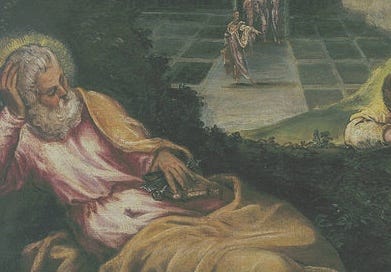Let us get up then,
at long last,
for the Scriptures rouse us when they say:
It is high time for us to arise from sleep.
The Rule of Benedict, Prologue, Line 7
This is part of an occasional series of meditations on the Prologue to the Rule of Benedict.
Sometimes the most heroic act you can do is get out of bed. It is, for anyone, perhaps the most difficult task of the day, because all the conditions--warmth, comfort, peace--are present for making it impossible until our minds begin to stir and duty, or nature, calls.
Many of us (and I certainly include myself) are asleep even when we are awake. There is a sleep beyond that which the body needs, and the modern world seems to almost emit a vapor that induces moral, spiritual, and mental torpor. Modernity seeks to anesthetize us, and it is very tempting to just let it.
This waking sleep does not close our eyes, but rather redirects our gaze to objects that do not merit it. I don't mean things which sooth weary minds. Our art, play, and entertainment have genuine social and spiritual value. I've worked on a magazine about games for three decades, so I'm obviously not retreating to my cave any time soon.
The Rule of Benedict doesn't call oblates to that level of withdrawal, but rather to live and interpret its guidance where God has planted us, in a way suitable for our lives. It offers us a scaffolding to build upon: a habit of faith that, with repetition, opens our eyes and our hearts to new ways of seeing. That habit--and each of us must build our own through discipline with the help of grace--allows us to break the spell of the sleeper and gives us the great gift of an inner silence, so we can hear:
My beloved speaks and says to me:
“Arise, my love, my beautiful one,
and come away,
for behold, the winter is past;
the rain is over and gone.
The flowers appear on the earth,
the time of singing has come
Song of Songs, 2:10-11
The problem, however, is that outside of the cell or cave or retreat, the world is purpose-built for soothing us beyond reason or need and into an apathy of the senses, where the next thing presented to us is algorithmically selected to detain our attention just long enough for the next thing, and the next, with an occasional pause for ads.
Nothing comparable to electronic media has been seen in the history of the church: instantaneous, unending, compulsive, customized, commodified dominance of the very portals of the mind and soul. It lulls us into a sleep of the mind and soul that offers distraction or mere stimulation rather than engagement. It renders us docile, or manipulates us to outrage, or uses for the profit of others, but one thing it certainly can't do is save us.
It's hard to break free even when we're alert to the effect, and it's impossible when we are not aware that something more--something greater--calls us from that endless slumber. We can choose to turn away by building habits, by cultivating a life of the mind and the spirit, by the routine practice of prayer, through acts of charity.
And, for good or ill, the most effective way to break the spell of the world is through suffering and self-denial. Suffering, in greater or lesser degrees, shocks us back to consciousness, even if only for a time. Its fallout can be catastrophic, but the opportunity to hear God's call to awake, O sleeper, and arise from the dead comes with a brilliant and beautiful promise: and Christ will shine on you. I am writing this on the far side of a suffering that broke me, but allowed me to be rebuilt in a new way and wake to that light.
Sometimes it's hard to wake a sleeper, and it requires harsher methods than we prefer to use. Sometimes the sleep is so deep that a person needs to be shaken awake. The sleeper rarely thanks us in the moment, but we have good news for them. The day dawns on a world being continually remade by God, who is calling us to be remade as well, and each morning we rise do a little more of His work—on the world, on ourselves.
Besides this you know the time,
that the hour has come for you to wake from sleep.
For salvation is nearer to us now than when we first believed.
Romans 13:11





